On September 24, the ASIS&T SIG-KM International Research Symposium 2022 was held virtually. It was co-sponsored by the Center for Studies of Information Resources, Wuhan University, Department of Information Science, University of North Texas, School of Information Systems and Technology, San Jose State University, College of Information and Communications, University of South Carolina, and the Department of Information Science and Library Management, University of Dhaka.
More than 100 experts and scholars from China, the United States, Poland, Colombia, Estonia, Bangladesh, India, the Philippines, Pakistan, Iran, Nigeria and other countries and regions had in-depth exchanges around the theme ofKnowledge Management in an Information-Resilient Society.
This Symposium consisted of keynote report, article presentation, dissertations exchange, poster presentation, etc.
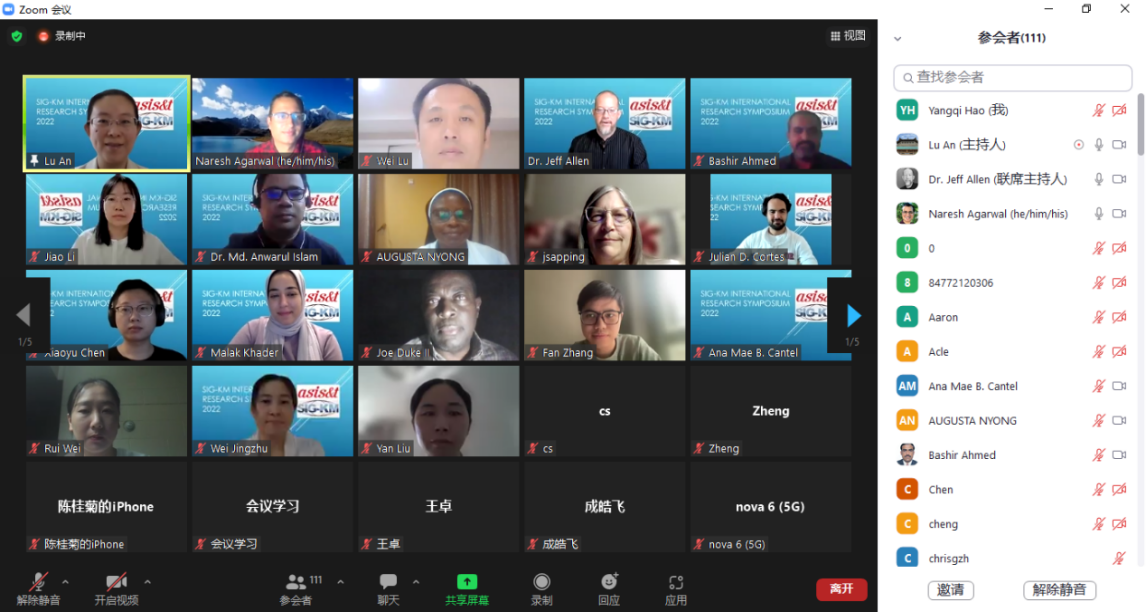
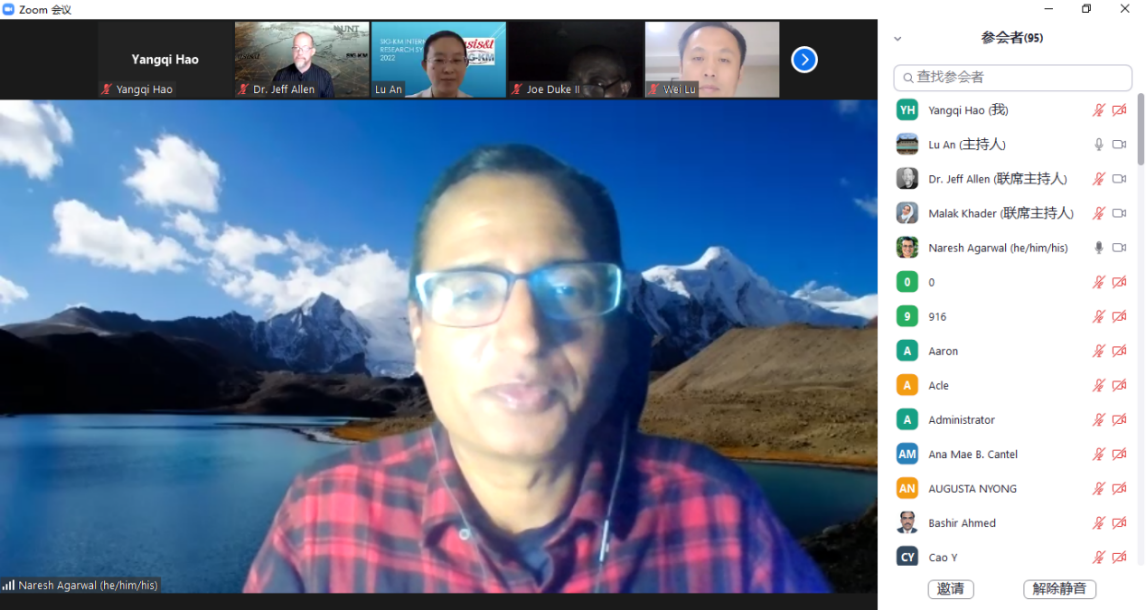
Naresh Agarwal, Professor and Chairman of ASIS&T, delivered an opening address. He welcomed the experts and scholars from all over the world, and hoped that this meeting would be a dynamic and significant one. He hoped that all participants could have in-depth exchanges and discussions, be inspired by the wonderful collision of thoughts, and build a beautiful friendship via the meeting.
Lu An, Chairwoman of ASIS&T SIG-KM, Professor at the School of Information Management, Wuhan University, and Director of Data Management and Knowledge Service Research Office ofthe Center for Studies of Information Resources, Wuhan University,delivered an address. She expressed gratitude to the chairman of ASIS&T, keynote speakers, article authors and researchers for their active participation, pointing out that everyone is a part-time knowledge manager, and expecting the participants to communicate freely.
Jeff M. Allen, Chair-Elect of ASIS&T SIG-KM, Regents Professor at the University of North Texas, welcomed the participants and introduced the members of SIG-KM.
Wei Lu, Professor, Dean of the SIM, and Researcher of theCenter for Studies of Information Resources, Wuhan University,gave a keynote speech entitledAcademic Keyword Semantic Function Identification and Its Application. In view of the limitations that the current research on lexical function recognition relies on artificial construction and lacks publicly available data sets, and combining the advantages and disadvantages of keyword function recognition models based on a variety of different strategies, he proposed a lexical function recognition model MPT, which has good performance in both low-resource and high-resource situations. This model can be applied to the research of author's keyword selection behavior, novelty measurement of academic papers, mechanism extraction, etc.

Wei Lupointed out that lexical function is the semantic function of vocabulary in a specific context. In different academic fields, vocabulary functions are also different. For example, the lexical functions in the field of computer science mainly include data, tools and measurement standards, while those in the field of medicine mainly include drugs, diseases and genes. Keyword is a kind of functional vocabulary that can concisely summarize the content and theme of the text. The function of identifying keywords in academic literature can provide the underlying indexing support for downstream tasks. Therefore, he believes that it is of great theoretical significance and practical value to study the functional recognition of vocabulary.
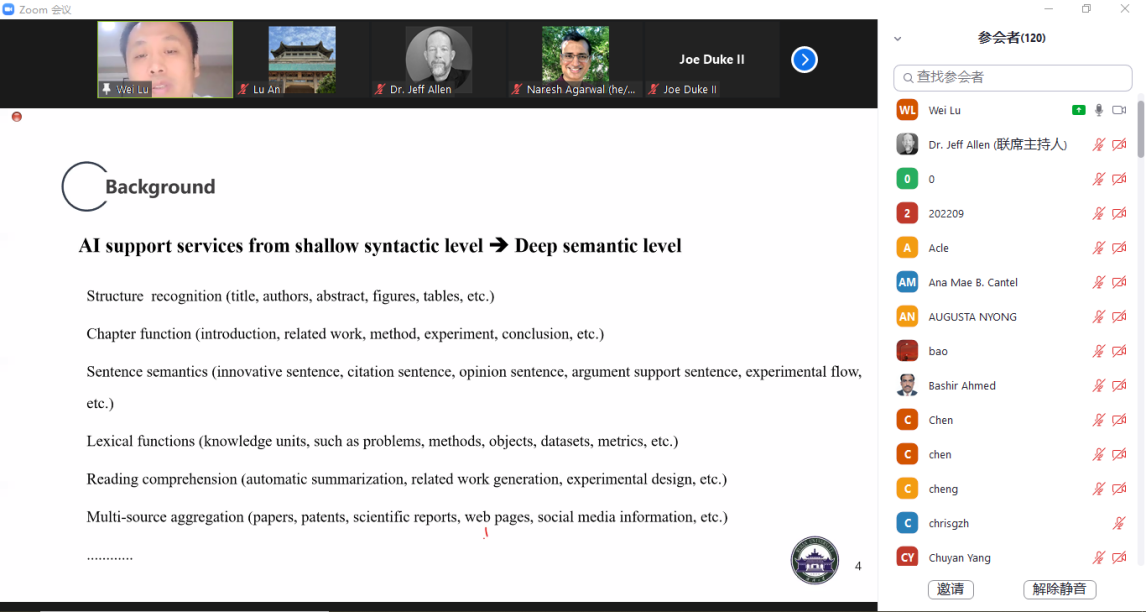
Jim Jansen, principal scientist in the social computing group at the Qatar Computing Research Institute, Professor in the College of Science and Engineering, Hamad bin Khalifa University, Adjunct Professor at the College of Information Sciences and Technology at The Pennsylvania State University, and Editor-in-Chief ofInformation Processing & Management, gave a keynote speech entitledThe Illusion of Data Validity: Why Numbers About People Are Likely Wrong.

Jansen started with Lord Kelvin's statement about numbers, and took the data analysis in his research reportMeasuring user interactions with websites: A comparison of two industry standard analytics approaches using data of 86 websitesas an example, expounded the illusion of data validity, and pointed out that some numbers about people might be wrong. This report compares two analysis methods based on different industry standards by measuring the interaction data between users and websites of 86 websites. Through the research, it is found that the results obtained by the two analysis methods are significantly different. Jansen believes that the indicators obtained based on the two analysis methods may be neither accurate nor right, because there are many errors in the measurement process of these indicators. He pointed out that when we analyze numbers about people, we often think that we are calculating numbers, but in fact, we are usually measuring, and there must be some errors in the measurement. He suggested that when dealing with the numbers about people, we should check whether it is calculating or measuring, and if it is measuring, we should recognize the source of the error.

Students and teachers from various universities and research institutes shared their experiences on the management ability and performance of small and medium-sized enterprise alliance, government science-research-technology policy research, five personality traits and knowledge sharing willingness of academic librarians, the development of online movie metadata set required by users, the connection between data and literature by database enrichment technology, the diversified recommendation model of multi-label user portrait and knowledge service system of knowledge representation, the link between knowledge library and text, and the discovery of the third factor variable used to understand the relationship between Covid-19 clinical knowledge concepts.
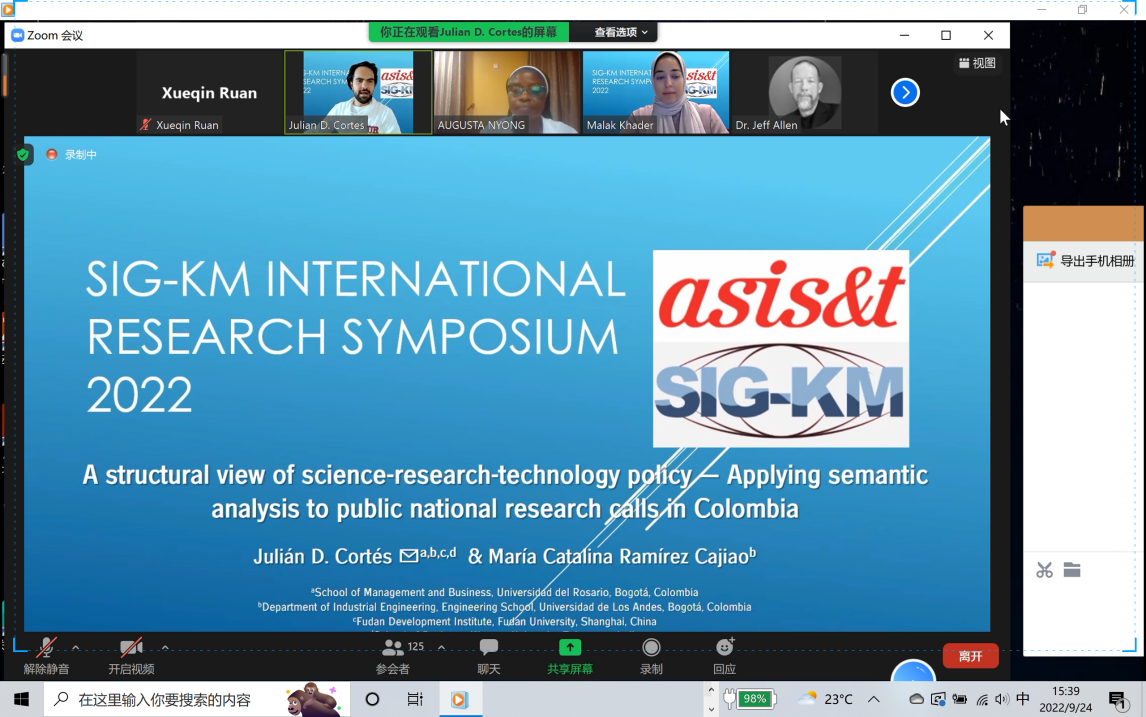
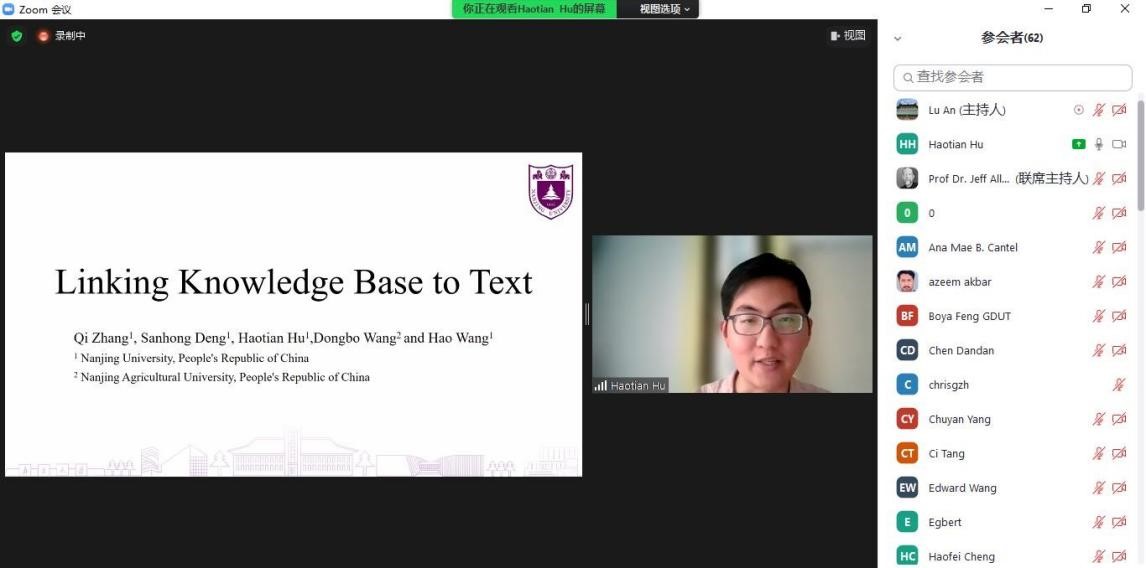
Postgraduates shared their dissertations on topics such as how to attract users to pay for knowledge by Internet celebrity, the best reading path of cross-platform network information of crisis events, the influencing factors and formation mechanism of group polarization under the background of COVID-19 epidemic, and the prospect of the construction of digital library of papers in Pakistani University Library.
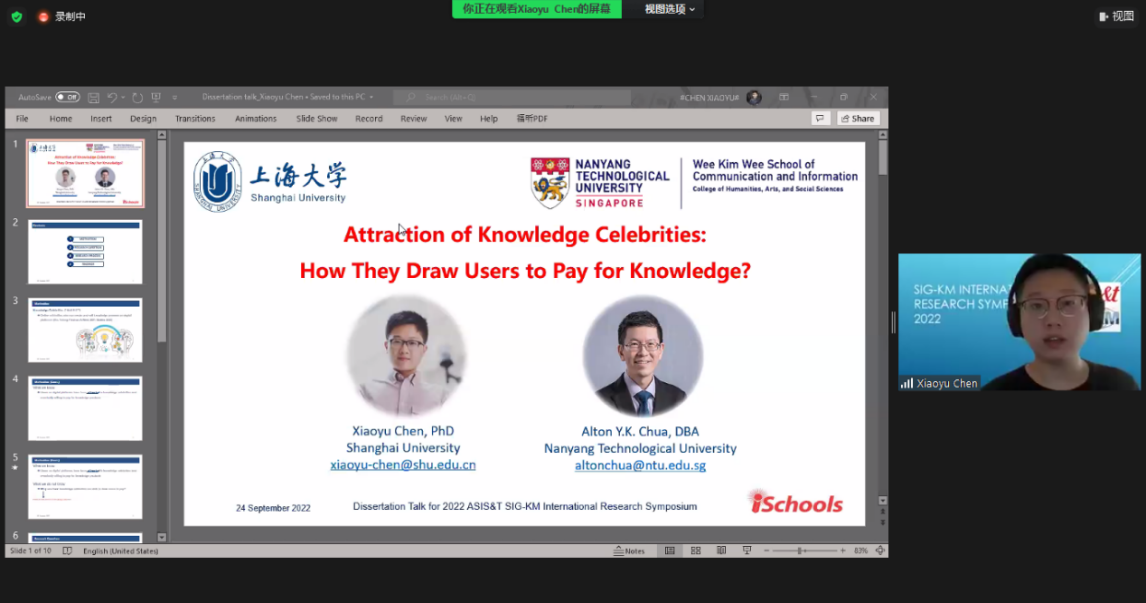
Scholars from the University of North Texas, Tallinn University of Technology, Central Philippine University, and Sun Yat-sen University, etc. demonstrated their research in the aspects of swarm intelligence model, the implementation and application of Web-based library chatbots, the knowledge risk management framework of healthcare organizations, and the intellectual property information services of universities.
Jeff M. Allenalso shared his research on swarm intelligence model for more than five years. He believes that wisdom has evolved from a variety of different characteristics and virtues through complex interactions, and these characteristics and virtues can be gathered among knowledge and experience, self-understanding and understanding of others. Wisdom can "evolve" from knowledge when a person or a group of people use their knowledge, experience and understanding to identify patterns, connections and basic principles, so as to make correct judgments and wise decisions. Swarm wisdom is a comprehensive collection of intelligent behaviors cultivated and developed by an interrelated group, and its purpose is to determine a beneficial action plan for the group, community and society.
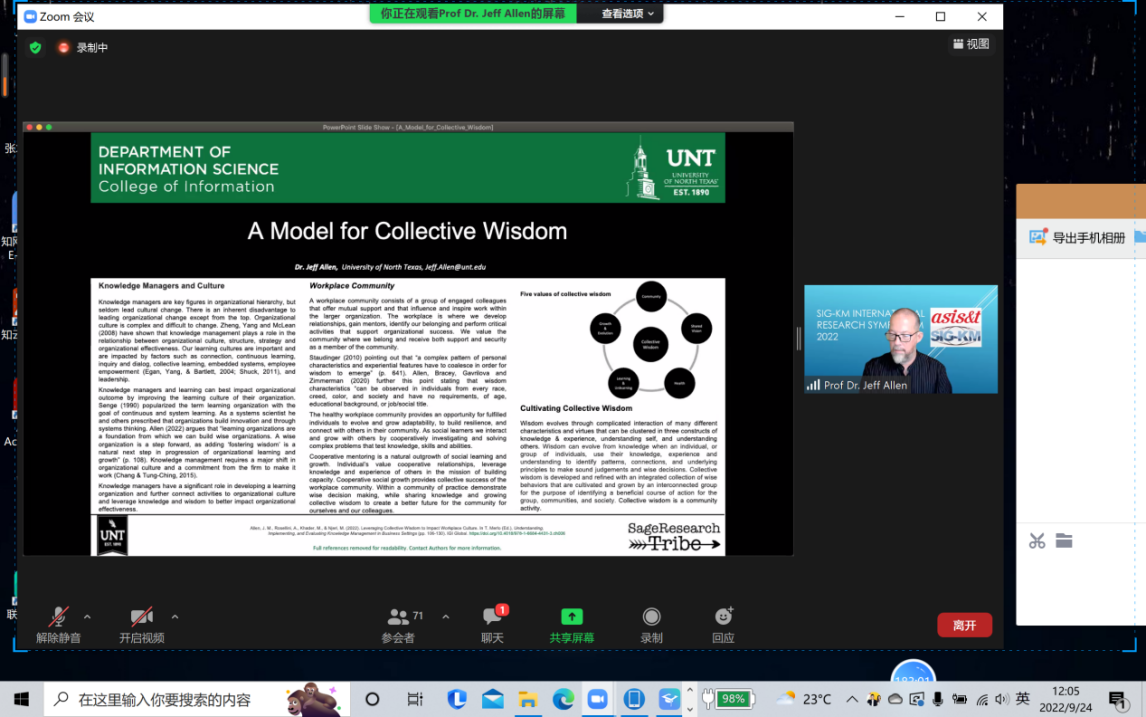
Jeff M. Allenput forward the model of swarm intelligence, which describes the five factors needed for the development and formation of swarm intelligence: community, shared vision, health, learning & unlearning, growth & evolution. First of all, about the community, all the knowledge we share in the family, workplace and other communities is actually cultivating a kind of swarm wisdom. Secondly, the prerequisite for community members to share knowledge willingly and freely is that they all share a common vision. A common vision can guide community members to decide what to do now and what goals to achieve. Thirdly, the community needs a healthy and good development environment. Only by cooperating and communicating in a healthy organization or workplace can people know, share and learn. At the same time, we should keep learning, not only to learn the knowledge and skills in our own fields, but also to explore those fields that we have never reached, and to dig up new things and new knowledge. Finally, growth and evolution. All the knowledge we have accumulated is not static, but constantly developing and evolving. Only through this process can these knowledge and experiences really be internalized into the wisdom we use.
Three winners and one honorary nomination award were selected among thearticles, dissertations and posters shared in the Symposium.